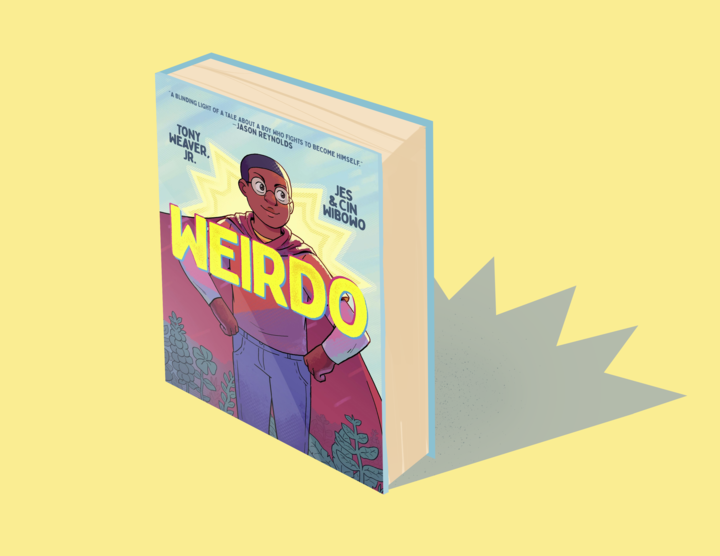Content warning: This article includes mentions of attempted suicide.
If there was, say, someone posing like their favorite anime character in public, I would think to myself: “I love that for them.”
The media we consume is truly at its best when it helps people become more joyous and open about who they are — widening our views on who can be out and proud in society at-large. That is the very message that Tony Weaver Jr. beautifully conveys in his debut graphic memoir, “Weirdo,” published last month.
“Weirdo” is an autobiographical account of an 11-year-old Weaver Jr. being bullied for his love of writing and his nerdy interests, such as anime and superheroes — things the bullies thought made him a freak who deserved to be targeted. As a new kid at school, Weaver Jr. has a teacher who belittles his creative passions and schoolmates who constantly send online insults and bully campaigns his way. With seemingly everyone in his life telling him, in one way or another, that a nerd like him doesn’t belong in the world, an especially traumatic experience drives him to attempt to take his own life.
Told from a first-person perspective, the book takes readers through Weaver Jr.’s experiences in therapy and his transfer to a second school. In this new chapter of life, middle school Weaver Jr. finds a community that helps him become happier, stronger and prouder of his writing and the nerdiness that make him special.
So much of my love for “Weirdo” comes from the fact that I see myself in the central character — even though I am a decade older. When Weaver Jr. asks himself, “How can I be a leader of tomorrow if nobody wants me today?” and when he thinks, “I don’t want to die…I just want to feel okay. But I can’t do that here,” I felt it. Upon first reading those pages, I had flashbacks of my not-too-distant past at Stanford.
For the first time, I could see my deep-seated shame and self-hatred for my academic failures in someone else’s experiences. I understood profoundly what he meant when he wrote that “me disappearing would be best for everyone.” It took me back to those dreadful nights wondering if I had the strength to make it to the next day. He didn’t have to go into more explicit details; I could still connect with him and feel less alone. But I still felt truly seen. My connection to Weaver Jr. serves as one example of this book providing a sense of hope and belonging to those that need it the most.
Personally, I could not help but love the mental health message of “Weirdo” even more because of how Weaver Jr. delivers it through frequent references to all of his younger self’s nerdy interests. Anime enthusiasts will certainly notice the use of visual tropes like color failure, rivalry sparks and anime glasses. It was also hard to miss the references from series such as “JoJo’s Bizarre Adventure,” “Yu-Gi-Oh!” and “Phoenix Wright: Ace Attorney.”
The character Weaver Jr. is even given role-playing game (RPG) style enhancements upon first dawning his “Young Hero’s Cape,” as seen in the cover of “Weirdo.” Leaning so heavily on anime as a visual language helps “Weirdo” “clarify the inner world of characters without resorting to words” — underscoring a visual style that promotes both an expressive story and Weaver Jr.’s love of the media itself.
With references to his favorite media seamlessly gracing nearly every page, Weaver Jr. wears his nerdy passions loud and proud. His nerdiness even manifests in how time is spent with friends, talks with his therapist and starting to stand up to his bullies. The ways in which being a nerd is actually key to his growth is a powerful display of the distances you go when doubling down on your so-called weirdness. Weaver Jr. putting front and center what once pushed him into the shadows of a darkness that almost ended his life sends readers a clear message: you deserve to live as your best self in this life.
Another stand-out strength of “Weirdo” is its keen awareness of the role that community plays in someone’s mental health journey. Weaver Jr. powerfully sums up the dangers of community hostility by asking himself the question, “If your environment does everything it can to stop you from blossoming…why grow at all?”
When it seems like everyone is shaming you for the very things that make you who you are, it can have a snowball effect that results in severe, and at times life-threatening, self-hatred. The difference is clear for young Weaver Jr. when he finds a community that encourages him to write more passionately and display the nerdy things bringing him joy, instead of shaming him.
Ultimately, Weaver Jr. writes with profound love and solidarity for the people who, in one way or another, have been shamed for their differences. He hopes that readers can become “a person who’s happy, kind, and who can unapologetically love what they see when they look in the mirror.” He encourages readers to “never lose sight of the light” and take the parts of themselves that society shames them for and “turn the usual into something extraordinary.”
Weaver Jr.’s challenging journey sent him on a path toward turning his nerdiness up to 11 and being transparent about his own mental health. His return as a more confident, self-realized version of himself truly makes for a heroic and beautiful graphic memoir. “Weirdo” shows readers the right kinds of community, self-love and hope that we all always deserve.
Editor’s Note: This article is a review and includes subjective thoughts, opinions and critiques.
